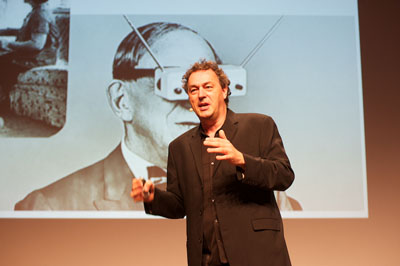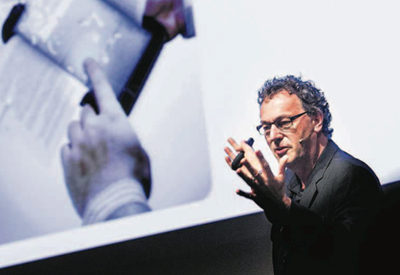Business & Startups
Global job revolution Digitalization and artificial intelligence
 Gerd Leonhard: “Predicting how we will live and work in 35 years is impossible.”
Gerd Leonhard: “Predicting how we will live and work in 35 years is impossible.”
Gerd Leonhard is a renowned futurist and future consultant, international keynote speaker and strategy coach, author, as well as the founder and CEO of The Futures Agency. In this interview with Langmeier Software, he discusses emerging technologies, the erosion of privacy, and the future of the job market.
Mr. Leonhard, where do you see the most groundbreaking changes between today and the year 2049?
First and foremost, as a futurist and consultant, my role is to identify upcoming trends and developments, synthesize them, and outline plausible scenarios for the next five to seven years. The key is to observe carefully, listen attentively, and reconcile diverse data and perspectives to present clients with a credible and preferred path into the future.
To address your question directly: Predicting how we will live and work in 35 years is impossible. What we can say with certainty is that we are living in an era of unprecedented acceleration in technological adoption. We are witnessing a surge in hyper-efficiency, driven by increasingly sophisticated software, more affordable devices, and high-speed mobile broadband. Digital applications and the Internet are not only transforming industries—think Industry 4.0—but have also become integral to our daily lives. Suddenly, innovations that once seemed like science fiction are now reality: robots assist surgeons during operations, voice assistants like Siri and Google Now provide instant information, and artificial intelligence (AI) is advancing at a remarkable pace. And this is only the beginning.
In just a few years, our habits regarding consumption, leisure, and shopping will be fundamentally different. The economy is evolving exponentially, leading to the decline of traditional trades and services. The disruption of the taxi industry by platforms like Uber is a classic example of digital Darwinism—a trend that will only intensify.
Many technologies today rely on data collection. I see the world moving towards a complete abandonment of individual privacy. How do you view this development? Is the future of privacy as bleak as I imagine?
Back in 2010, Mark Zuckerberg of Facebook predicted that privacy would no longer be a social norm. Today, we see people willingly trading their privacy for access to popular platforms and networks. Most users do not read the fine print or terms of service; otherwise, they would realize that they are paying for “free” services with their personal data. Internet companies then use this data to target users with personalized offers—often without explicit consent.
I believe that data will continue to be exchanged openly in the future. However, despite statements to the contrary from companies like Google, I do not think privacy is entirely lost. Of course, data collection carries the risk of misuse. That is why I advocate for a digital social contract—at the national or even global level—to regulate how our data is managed and protected.
What impact does the current obsession with data collection have on social behavior?
We are witnessing the emergence of a big data society, and it remains unclear what users will ultimately accept. For example, if our smartphones reveal where we park our cars and this information affects our insurance premiums, I am convinced there will be pushback. The reality is that data does not always capture the full complexity of human life. Blind trust in data—what I call data hubris—is not always justified.
Consider online dating: based on someone’s data, we might think we know if they are a good match, but many important aspects cannot be quantified, even with big data. In general, technology and the data tsunami mean that we may have to let go of things we currently take for granted. In the future, we might rely on devices like the Nike FuelBand or health apps to monitor our well-being, rather than checking ourselves—a daunting prospect for many. We may approach potential partners virtually and lose the ability to connect with the person sitting next to us on the train. This could be either a blessing or a curse.
 “Digital assistants will replace accountants, financial data analysts, and supermarket cashiers in the next 10 to 20 years.”
“Digital assistants will replace accountants, financial data analysts, and supermarket cashiers in the next 10 to 20 years.”
With the overwhelming amount of information available today, I find it difficult to distinguish what is important. Does this information overload create a “knowledge gap” between those who can filter information and those who cannot?
The Internet is democratizing knowledge, making it accessible to everyone. Never before have so many people had access to such vast amounts of information. The challenge now is to learn how to use this information effectively—and new jobs are emerging to address this need. For many, it is indeed becoming increasingly difficult to separate the important from the trivial, as the sheer volume of information can be overwhelming. Many people get lost in the endless stream of online content.
Advising others on how to navigate the Internet is becoming a profession in its own right. I do not believe that a widening “knowledge gap” is inevitable. Instead, we are more likely to see the rise of filter bubbles or information bubbles: algorithms predict which content might be relevant to users, effectively isolating them in a digital echo chamber where opposing viewpoints are rarely encountered.
The rationalization of the workforce seems to be accelerating. Today, we check in at airports using machines and pay at grocery stores without cashiers. Which jobs are at risk?
Simple, repetitive, and many manual jobs can now be performed by machines. Intelligent software, robots, and digital assistants will replace roles such as accountants, financial data analysts, and supermarket cashiers within the next 10 to 20 years. In Europe, up to 65% of current jobs are at risk. We are on the brink of a global job revolution driven by digitalization, automation, and artificial intelligence.
Can the jobs lost to automation be replaced by new professions in the future?
Some jobs will certainly be replaced, while others will not. In Switzerland, we have a good chance of adapting, but the situation is more challenging in countries like China or India. As hundreds of millions of jobs disappear, new professions will emerge. In fact, half of the professions that will exist in 2030 have not yet been invented. Here are some examples of jobs that will soon become reality:
- Privacy Managers: These professionals help individuals and companies regain control over their data. They can liberate data held by institutions or media, and assist clients in changing or deleting personal traces online and in search engines.
- Artificial Intelligence Supervisors: In the future, AI supervisors will monitor ultra-smart software, robots, and digital assistants. They will ensure these systems are configured correctly and prevent scenarios where machines act against human interests.
- Offline Therapists: As social media and mobile computing dominate our lives, more people struggle with the pressure of being constantly online. Offline therapists help individuals find balance, teaching them how to enjoy being offline as a luxury.
- Social Graph Analysts and Branded Story Designers: Today’s marketing professionals are evolving into branded story designers, crafting compelling narratives for brands and products on social networks. The traditional advertising manager will soon be obsolete.
- Virtual Tour Guides: With technology enabling immersive, three-dimensional experiences of natural wonders, cities, and traditions from home, virtual tour guides will lead people on digital adventures, ensuring seamless and engaging journeys.
Ultimately, when considering the job market of the future, we should encourage our children to pursue careers that engage the right side of the brain—the seat of creativity. The more “human” a profession is, the better its prospects in the evolving job landscape.
about the author Urs Langmeier
Founder and CEO of Langmeier Software
I don't want to complicate anything. I don't want to develop the ultimate business software. I don't want to be listed in a top technology list. Because that's not what business applications are about. It's about making sure your data is seamlessly protected. And it's about making sure everything runs smoothly while you retain full control and can focus on growing your business. Simplicity and reliability are my guiding principles and inspire me every day.
Related articles
New features and improvements in the aBusiness SuiteWhich type of backup is the best choice for my data?This is how important data backup is in real life
This article covers the topics:
Langmeier Backup Software




